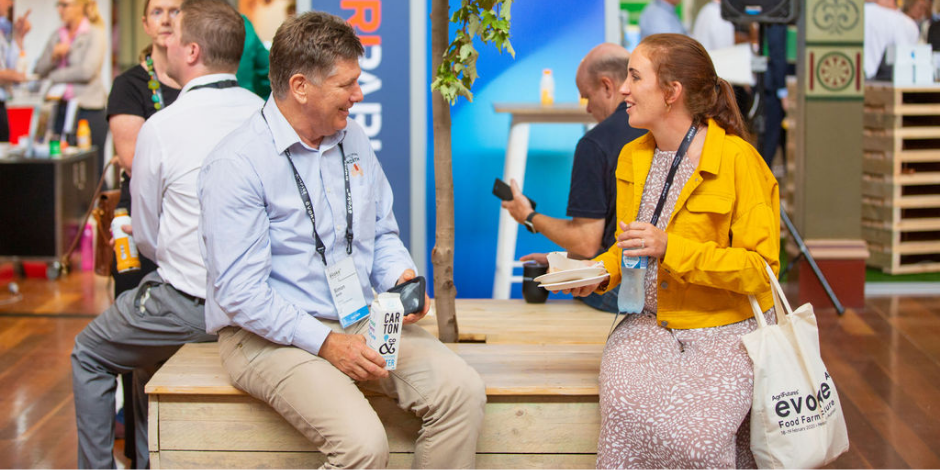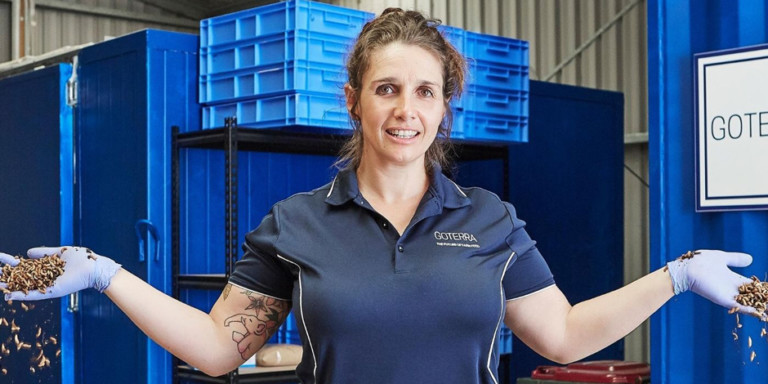Tips for building an agritech startup that solves real problems
Two leading Australian entrepreneurs looking to provide solutions to climate change and weather risk shared valuable insights about their startup journey in the first session of evokeAG.'s Grassroots Series, produced in partnership with Cicada GrowLab.

How do you commercialise an idea to meet a real market need?
Dale Schilling from Hillridge Technology, an early-stage startup enabling weather insurance for farmers and Olympia Yarger of Goterra, a Canberra-based waste management startup, reviewed their journeys in the Grassroots Series session one: ‘Are you solving a real problem?’.
Both were clear about the need to work with customers to ensure their ideas addressed a meaningful problem, that they would buy their product, and that it would deliver a solution effectively.
The Grassroots Series, created in collaboration with Cicada GrowLab and evokeAG., is designed to provide tangible advice for agrifood tech entrepreneurs, through six-weeks of online educational forums and one-on-one mentoring opportunities.
RELATED: All-star mentoring line-up to deliver foundations to early-stage innovators
In her introduction to session one, Cicada Innovations’ Dr Dharmica Mistry discussed how to figure out if an idea has commercial legs, consult potential stakeholders to ensure it addresses a problem, and learn to adapt or persevere, depending on the response.
Dharmica said building a sustainable business is a marathon, not a sprint, and taking an idea from pitch to reality takes a lot of drive and determination, as well as overcoming the fear of failure.
RELATED: AgriWebb’s investor journey to the UK
“Do the customer validation phase over and over until you have a proven business model, and don’t be afraid to change – you’ll learn the most from people who are sceptical and critical, so adopt an experimentation mindset, be flexible and agile,” said Dharmica.
“Don’t focus on your solution, focus on the problems your customers encounter when using existing alternatives. It’s a subtle change in perspective but is often the difference between inventing fake problems to justify your solution, versus uncovering real problems worth solving.
“Properly validating your concept before you offer it to market might mean changing teams, markets, customers, products, names and visions, but that is totally okay – you’re building a sustainable business.”
We are pleased to announce that @artesianvc completed an investment in Hillridge Technology. And like our farm weather insurance technology, it was all done 100% online.
Only after the investment did we actually meet Artesian in person. It’s a brave new world. pic.twitter.com/vJNNWf0DTM
— Hillridge Technology (@HillridgeTech) December 7, 2020
Prompted by the sale of his father’s farm during the millennium drought, Dale Schilling launched his technology startup by consulting more than 200 farmers over 12 months about the prospect of developing weather insurance. Half of them were supportive of the concept.
RELATED: Shaking up the livestock marketplace
He shifted his focus to local insurers and found they couldn’t expand their risk profile, so he looked globally, and whittled down a field of five to two companies who would insure Australian farmers.
Hillridge is now creating technology that connects farmers to insurance underwriters, who can provide short-term coverage tailored to individual farms – and recently received investment from Australian venture capital firm, Artesian Ventures.
How to validate technology and pivot along the way
Dale told Cicada Innovations’ Sally-Ann Williams that having to pivot his initial idea was a major challenge.
“I thought we’d be the ones selling the product to farmers but for regulatory reasons that wasn’t possible, so we had to reinvent Hillridge Technology as a software company offering tech to insurers who use it to sell insurance to farmers,” he said.
Also integral to his success was finding a co-founder, and staying true to his original aim.
RELATED: Why agrifood businesses need to value their intangible assets
“Emotionally it’s much easier having a co-founder to share highlights and act as a sounding board because mentors and advisers are not as invested. But choose the right one, make sure you trust one another so that when you’re hit with challenges or mistakes are made, you don’t turn on one another.
“Any time I’m struggling I think back to what Dad would want me to do and how I can help farmers, and that really gets me through the ups and downs of startup life.”

Goterra’s Olympia Yarger (pictured above) agrees that maintaining focus and customer relationships is critical.
“The pressure to meet the stereotype of how startups should behave can be really difficult. You feel like you can’t admit failure because that doesn’t show learning, but some of the technology that we initially thought was awesome was rubbish!” she said.
“We focus on the long game, turning up every day to learn, but it’s also important to show customers that you’re vulnerable. Don’t ask them to buy your stuff, ask what problem they have, be honest and genuine.
“If you come to the table with a great idea and work to make the relationship endure, they will be there, almost as members of your team.”
Olympia dreamed of finding a way to farm sustainably and mitigate climate change. Goterra has now successfully deployed and commercialised a modular solution that uses robots to collaborate with insects to redefine waste management.
RELATED: Goterra and Tenacious Ventures
As a result, this innovative closed-loop solution produces both high protein stock feed (insect meal) and nutritious soil conditioner (frass).
Who doesn’t love frass? #agtech #agriculture #farming #fertiliser #soilhealth #agchatoz #horticulture pic.twitter.com/2xHnHAaA6C
— GOTERRA (@GoterraCBR) January 18, 2019
The technology manages more waste, faster, and is enclosed in a modular unit so that waste can be processed close to where it’s created without haulage and trucking costs.
Key to our journey has been the learning that investors are human too, said Olympia.
“We feel like they’re Mecca, that we have to make the trip and beg for resources but you forget you have something of value to them. My investors taught me that I can engage with them as equals.
“If you make that relationship right from the beginning they’ll do pretty much anything to help your vision come to life.”
Enjoyed this story? Want to learn more about the Asia Pacific region’s innovative agrifood tech ecosystem? Sign up for our newsletter here and receive fresh stories about global leaders, farmers, startups and innovators driving collaborative change.
